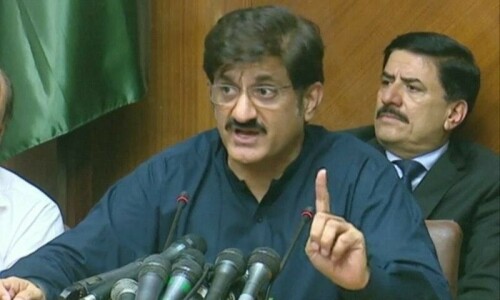KARACHI, April 4: In an enthralling performance marked by superb command over various genres of classical music, veteran vocalist Ustad Raza Ali Khan rendered raags and thumris with remarkable aplomb at a function organized by the All Pakistan Music Conference on Sunday night. A scion of the redoubtable Patiala Gharana, Ustad Raza learnt music first from his grandfather Ustad Bade Ghulam Ali and later from his father Ustad Munawwar Ali Khan.
Born in Karachi in 1961, Ustad Raza lives in Kolkata, India, and has taken part in numerous music festivals in India and abroad.
Ustad Raza prefaced his performance with a request: a rendition of Raag Aiman. (Every inch a purist, he called it Raag Yaman). Aiman is the first raag of the Kalyan thaath and, being a Sampooran raag, contains all seven notes in its aarohi and avrohi. The vadi sur of this raag is tivar Ga and the sumvadi sur is tivar Ni.
While many connoisseurs among the audience had listened to his father render the same raag with great élan –- incidentally, the same asthai “salona balam mora” — they were equally impressed with Ustad Raza’s scintillating performance and the effortless dexterity with which he employed “meendh” and “soot”. They also gave him full marks for his “taiyaari”.
Ustad Raza was accompanied by two of the finest musicians of this age: Ustad Roshan Ali Khan on the sarangi and Ustad Ustad Bashir Khan on the tabla. While Ustad Bashir played his percussion instrument with his usual skill and in a stolid manner –- as a rule, he smiles feebly only when the vocalist or instrumentalist loses his “taal” –- mention must be made of visiting Sarangi player Ustad Roshan in whose deft hands the stringed instrument sang gently like a crooner. Indeed, he proved that all inflections and variations of the human voice could be produced on Sarangi, believed to have been invented by Mian Sarang, a noted musician in the court of Mohammad Shah Rangeelay (1719-1748). Many deplored that the Sarangi has almost gone out of fashion in Pakistan and has been replaced by the harmonium, which is a poor substitute at the best of times.
Ustad Raza changed the “bool” of the rendition as he switched over to “Drut laye” and Ustad Bashir also changed gears to “Teen Taal.” After a while, Ustad Raza moved onto Tarana with the Tabla player flaunting his skill with “Rupak Taal.”
Ustad Raza rendered at least two “bandishain” in Bhopali, which also belongs to the Kalyan Thaath. In the same raag, he also sang a thumri.
The second part of the performance saw Ustad Raza render thumris, the hallmark of his family’s style of music. He ended the performance with the signature thumri of his family: “Naina morey taras gaiye”. His style bore a striking similarity to Ustad Bade Ghulam Ali’s, who immortalized this thumri.













































Dear visitor, the comments section is undergoing an overhaul and will return soon.